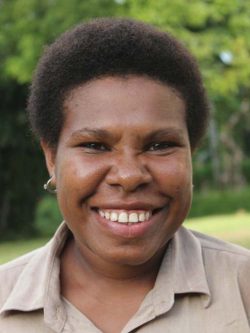Papua New Guinea: Reaching potential against the odds
08 November 2012|Oliver White

Port Moresby, 9 November 2012 – Like any other young girl, Anna grew up with a love for fairy tales – princes and princesses, people in dire situations and a hero coming to save the day.
But Anna’s life has been anything but a fairy tale. As a West Papuan refugee born and raised in Papua New Guinea (PNG), she realised growing up that without citizenship her life would be more difficult than others’.
Still, as the famous activist Helen Keller once wrote, “character cannot be developed in ease and quiet.” Anna has experienced her fair share of trial and suffering and is now a successful and ambitious young woman.
As a gifted student, Anna earned a government and UN Refugee Agency (UNHCR) supported scholarship to study a two-year diploma in vocational education training in the capital, Port Moresby.
On returning home, Anna obtained work in the Kiunga district office’s education department. Anna achieved all of this despite her limited legal status and lack of citizenship.
Growing up in PNG
Anna spent her early years in East Awin, a relocation camp of 2,366 refugees, established on 60 sq. km of land in the Western province. East Awin was founded as part of the governments 1996 Limited Integration Policy.
The policy stipulates that West Papuan refugees must live in the camps in order to receive any assistance. It is a policy that has left thousands to flounder in the urban and border areas without assistance or protection.
“Improvements in access to education and health services for both refugee communities and their PNG hosts would help to address needs more adequately,” said Wren Chadwick, JRS’ former Advocacy and Information Officer formerly based in Kiunga.
While the Catholic Diocese of Daru-Kiunga— which manages most of the schools and clinics in the area— works hard to ensure both are available, “the problems in accessing these services in these remote locations is shared by refugees and locals alike,” said Chadwick.
The requirements to live in East Awin to have access to residency permits also splits up families. When Anna was thirteen, she was sent to live in Kiunga to attend secondary school with a wantok, or extended kinship relatives.
“When I moved to Kiunga life became more difficult. At that time I missed my parents at lot,” Anna said. “When the sun set I used to look at the ground and cry.”
Looking to the future
Now, however, Anna is reunited with her family and sees her life and future in Papua New Guinea optimistically.
“Even though I consider my self West Papuan and am proud that I am West Papuan, my life and future are here in PNG,” she asserts.
While Anna’s hard work and perseverance has paid off, without citizenship or travel documents such as a passport, her chances of moving overseas will remain just a fairy tale.
Although entitled to both, naturalisation is prohibitively expensive at 10,000 Kina, or US $4850, and the government has stopped issuing travel documents.
“I want to go forward [to New Zealand] and get my degree and masters. My dream is to go overseas and study,” she said.


